Festivals
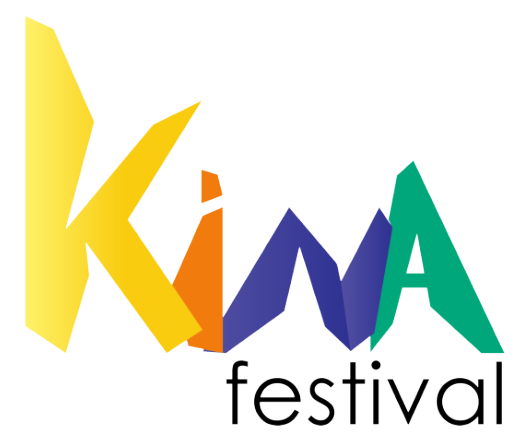
Kina Festival
Initiated in 2009 by ISHYO, KINA Festival is an international festival for children and young audience which aims through the power of imagination to encourage thoughtful engagement of the youth with the world. With a focus on developing children’s artistic abilities and nurturing their creativity, the festival showcases a diverse range of performances by both local and international artists. KINA focuses on building inter-continental and intercultural collaborations, producing and showcasing high quality art works, enhancing cultural diversity and creativity at a young age, supporting skills development, intercultural exchange and community involvement, shaping the next generation of artists and audiences.
Time: Biennal
Past editions: 6 editions
Next edition dates: April 2025
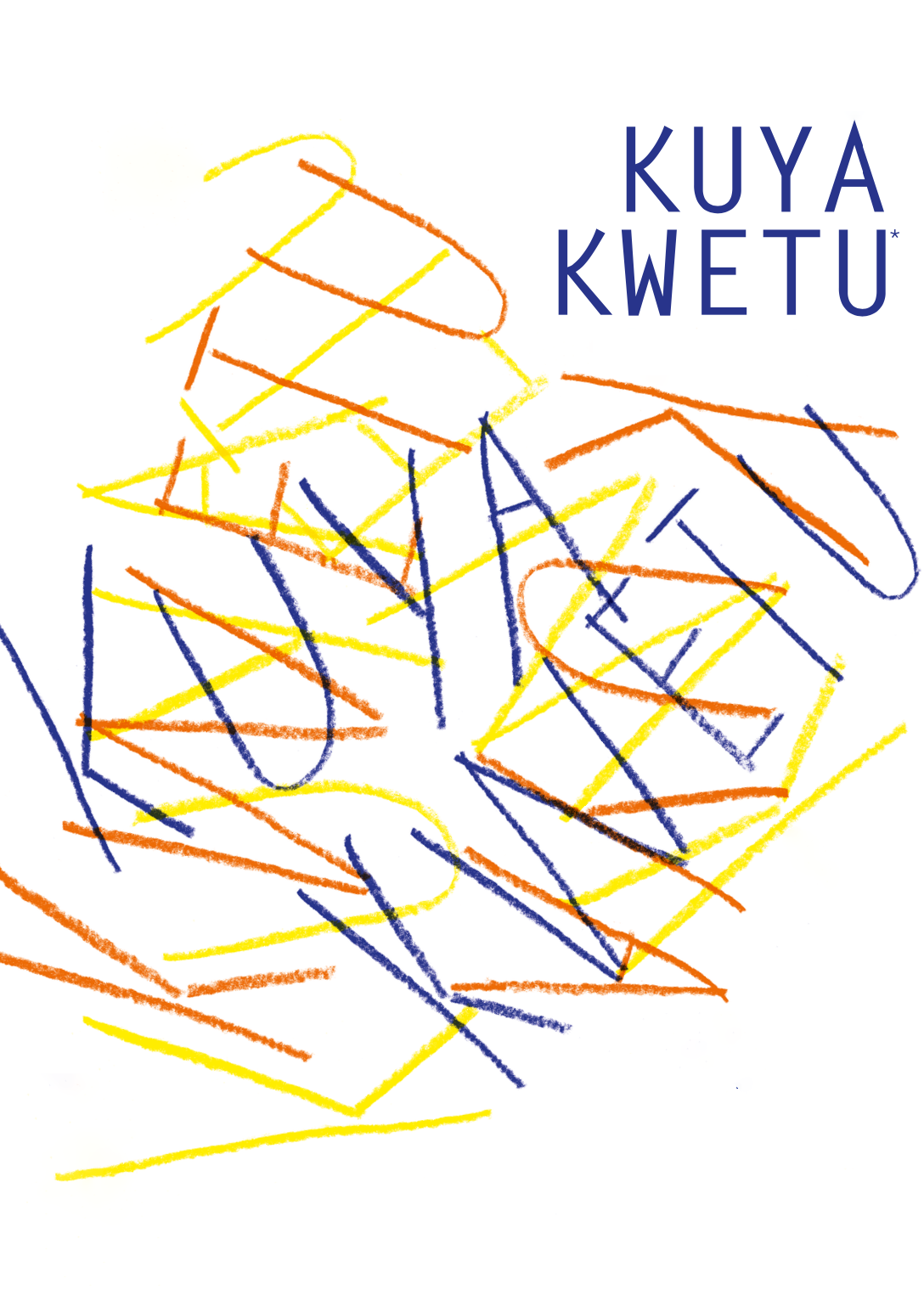
Kuya Kwetu
Kuya Kwetu “Welcome to our home” in Swahili, the Grand Est HQ is designed and produced by Isyo arts centre (Rwanda), Benoît Bradel of Passages Transfestival and Lee Fou Messica of the Espace Bernard-Marie Koltès (Metz). At the crossroads of theatre, music and the visual arts, a large audience gather to see some performances that tell the artistic story of contemporary Central Africa, and in particular that of the Great Lakes region. A wild week of performances, concerts, screenings, installations, workshops and encounters, with artists from 15 African countries: Rwanda, Burundi, Nigeria, South Africa, Somali l and Ethiopia, Democratic Republic of Congo, Congo-Brazzaville, Algeria, Senegal, Cameroon, Burkina Faso, Togo, Kenya, Mali.B.
KUYA KWETU 2.0 in Rwanda is an extension of the meetings, discussions, new synergies and fraternal links forged during the Africa 2020 Season at the Grand Est HQ. These encounters bring together artists programmed during the Africa 2020 Season as well as others that Ishyo, Le Passages Trans festival and the Espace Bernard-Marie Koltès are keen to support in new areas of creation/exploration, to facilitate artistic dialogue between artists from many different countries and to pursue together this ongoing reflection on the challenges of creation in Africa and in France, the mobility of artists, South-North and South-South collaboration, audience development, bodies and new voices emerging from the continent.
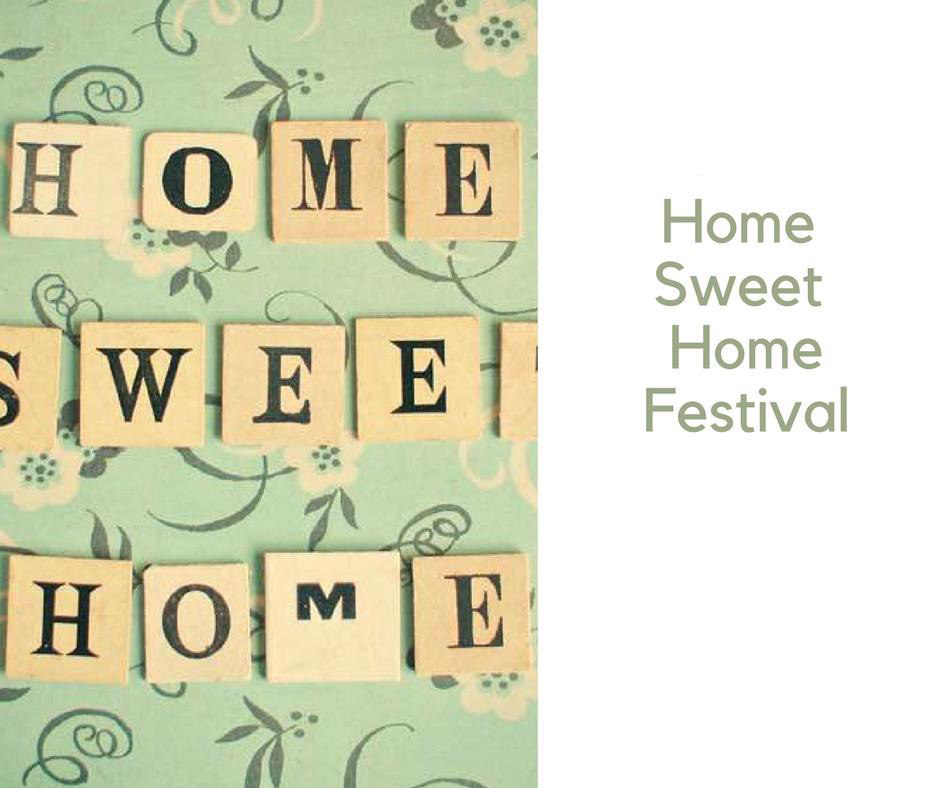
Home Sweet Home
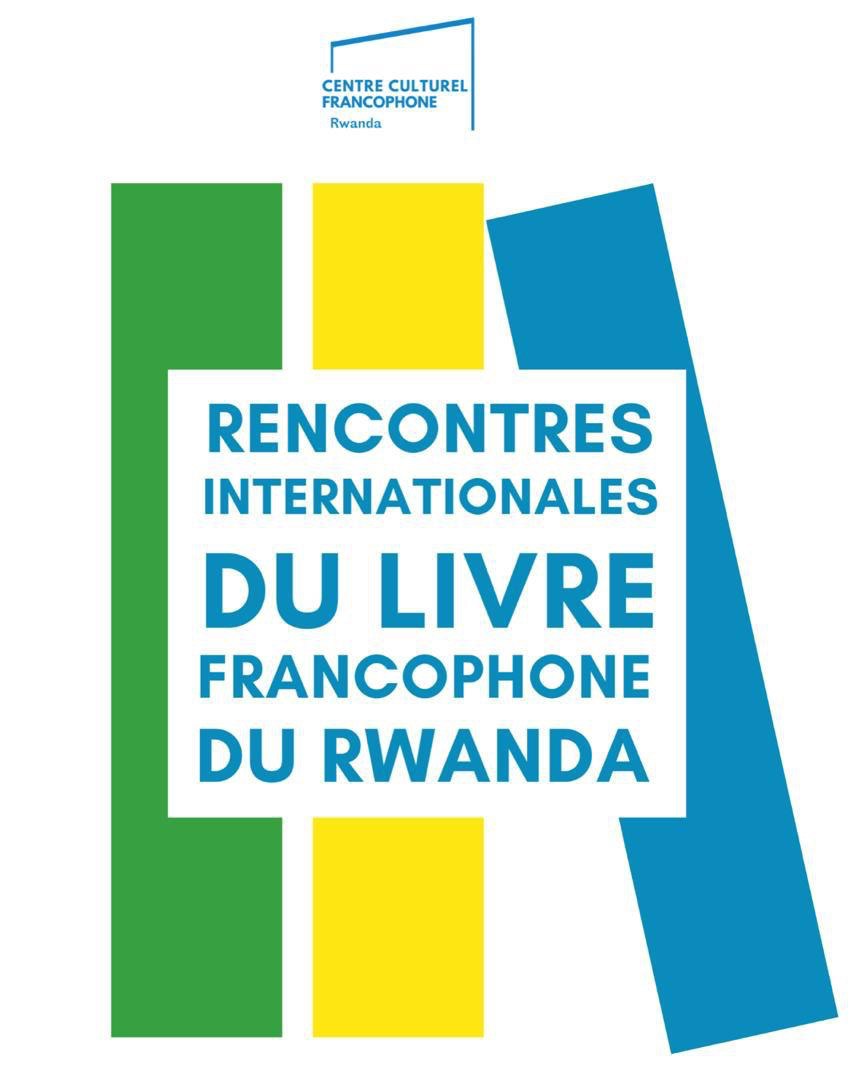
Rencontres internationales du livre francophone
The Rencontres Internationale du Livre Francophone is a cultural event dedicated to the exploration and exchange of various aspects of French-language literature. The event brings together authors, professionals from the book trade and other players in the publishing sector. The main aim of the Rencontres is to encourage discussion and reflection on the major issues facing French-language literature. This includes debates on a variety of themes, critical analyses and the sharing of experiences between speakers. It is also a unique opportunity for participants to forge links, create networks and contribute to the promotion of French-language literature.
This annual event is intended to be a cultural crossroads, bringing together speakers from a wide range of French-speaking horizons. It is an ideal opportunity to discover new books, celebrate the French language and strengthen links between literary communities. With its emphasis on international cooperation, it help as well to strengthen cultural exchanges and promote the richness of Francophone diversity.
Plays
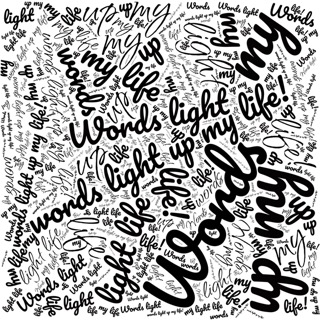
Paper skin
A theater play that explores resilience, love, and the power of storytelling, transcending spoken words.
Paper Skin
Paper Skin is an engaging theater play that goes beyond spoken words, exploring themes of resilience, love, and the impactful nature of storytelling. This production seamlessly incorporates sign language to enhance the universal experience for the audience. Through a compelling narrative, the play encourages reflection on the enduring connections found in the art of writing, reading and the silent eloquence of signs, offering a unique journey into human expression.
Director/script writer: Carole Umulinga Karemera
co-script writer: Michaël Sengazi
Music composition: Jules Kabale/Kenny Mirasano
Co-composer : Clément Iradukunda
Set designer: Tambwe Amin Tchaka
Production manager: Aubaine Hirwa
Light & sound director: Roman Kanobana
Studio producer: Michael Makembe
Blind Spot
A theater play that deals with the origins and social, economic and political implications of Anti-Black Institutional Racism and White Privilege.
Blind Spot
Script: Hassiba Halabi
Directed by: Carole Karemera, Lee Fou Messica
Dramaturgy: Sara Vanderieck
Musical composition: Hassiba Halabi and Cécilia Kankonda
Performance: Hassiba Halabi, Cecilia Kankonda, Carole Karemera
Production: Ishyo arts center (Rwanda) Coproduction: Amounra (Belgium), Espace Bernard-Marie Koltès (France) In partnership with Les Francophonies - From writing to the stage and the Théâtre de la Poudrerie with the support of the Institut français/Des mots à la scène, the creation residency program of M.A.R.S and Théâtre Varia. To Access Blind spot Website, click here.
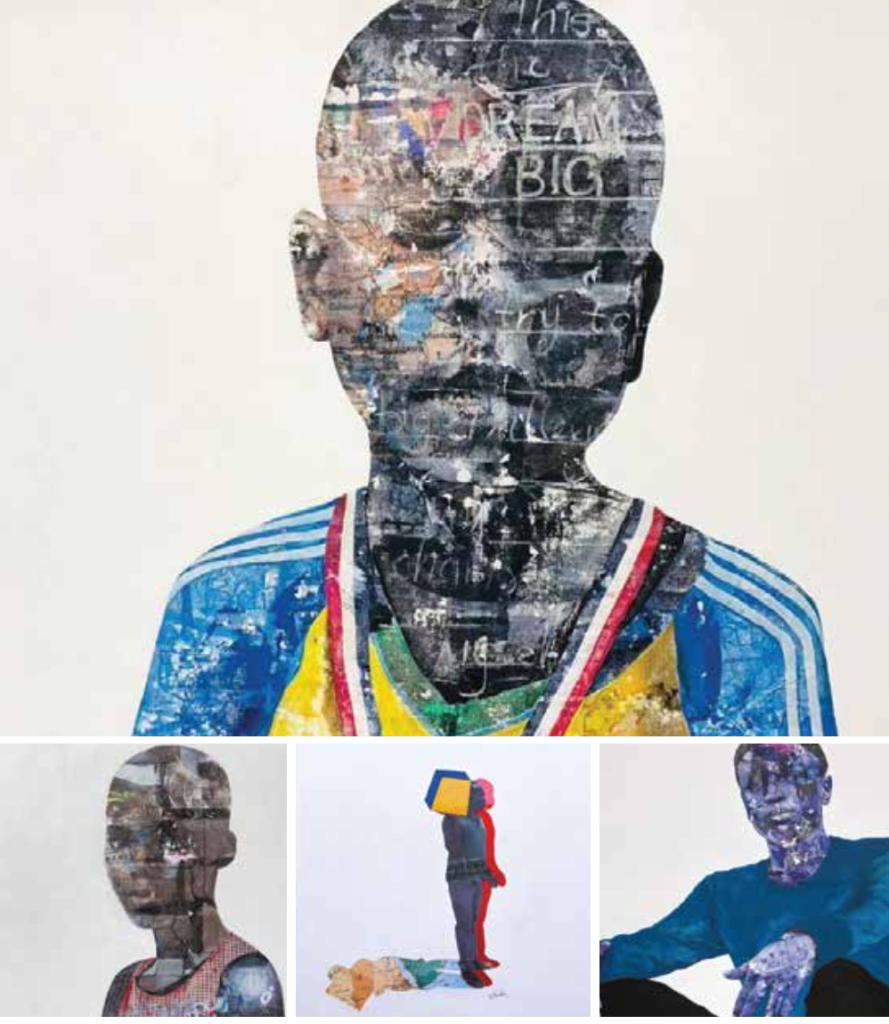
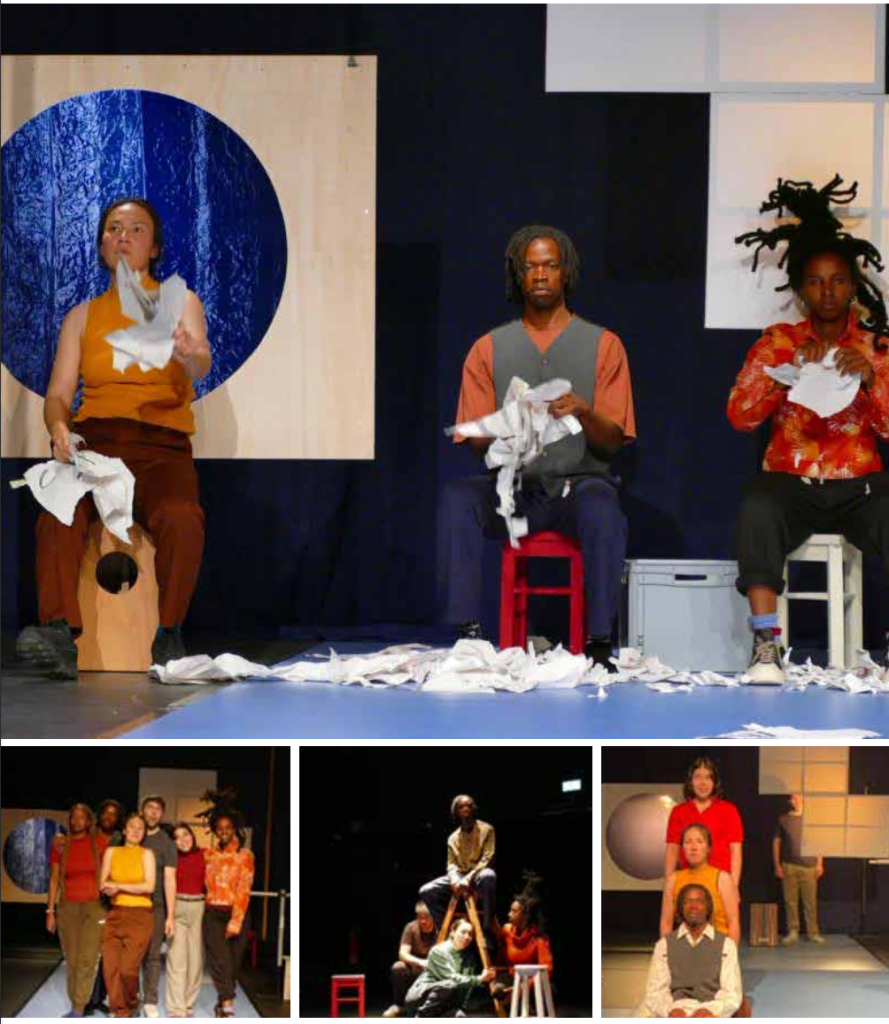
Talking about silence
Talking about silence is a theatre piece that explores the nature and impact of silence in history.
Talking about silence
Talking about silence is a theatre piece that explores the nature and impact of silence in history, both large and small, highlighting the family, historical and societal taboos that regulate coexistence. This production addresses profound themes related to individual memory and collective history, inviting the audience to reflect on their own encounters with silence. This production provides a thorough review of the significance of silence in our lives, and offers to the audience a space of reflection on the complexities and implications of silence, beyond its absence of sound, invites as well the audience to contemplate how silence influences personal and collective experiences.
Age: From 13 to 93 years old
Language: English
Time: 1 hour
Production: Ishyo Arts Center (Kigali/Rwanda) and the HELIOS Theater (Hamm/Germany) are coming together for the second time and have created a new theatre production
For more information click here
Little Kesho
A musical ecological philosophical storytelling show that address climate change and the imbalance of our relationship with nature.
Little Kesho
A musical-ecological-philosophical storytelling show that is poetic, energetic and engaging with protean cultural and musical aesthetics and references, which combines storytelling, slam, soul, funk, Afro Fusion and traditional music from Rwanda and East Africa. KESHO in Swahili means tomorrow, and in this show created by young Rwandan artists aged 17 to 27, essential and urgent themes are creatively addressed to imagine tomorrow and the future-in-common: climate change, erosion of biodiversity, the imbalance of our relationship with nature, non-respect and the absence of protection/preservation of our environment, pollution, overexploitation leading to the impoverishment of soil, air, and the choices and the assumption of responsibilities that are available to us and especially to the younger generations.
Writers: Sandra Nadege Uwayezu, Michael Sengazi, Seraphine Umutoni, Regis Igihozo Nsengiyumva, Esther Uwase, Jean Paul Ingabire, Umulinga Karemera
Musicians: Emmanuel Jr. Gasasira, Etienne Ishimwe, Raphael Manzi Rusake
Vocals: Berthile Urujeni, Bill Ruzima, Jean d'Amour Ngarukiyintwari, Kenny Philip Mirasano, Alyne Sano, Jules Cesar Niyonkuru, Micheal Makembe, Moise Mutangana, Richard Mahirwe, Weya M. Viatora, Hervé Twahirwa
Storytellers: Sandra Nadege Uwayezu, Michael Sengazi, Ishara Manzi, Hervé Kimenyi, Muyango, Carole Karemera
Composition & musical direction: Hervé Twahirwa
Artistic direction and Production: Carole Karemera
Production assistant: Michaël Makembe
Coordination assistants: Ishara Manzi, Aurore Iradukunda, Soumaya Rwagasana Translation: Epiphany Gashugi, Michaël Sengazi, Hervé Kimenyi
Visuals: Wandulu Timothy
Production: Ishyo Arts Centre (Rwanda) with the support of Access Culture program of the Agence Française de Développement coordinated by Institut Français (Paris) and Art Ubuhanzi.
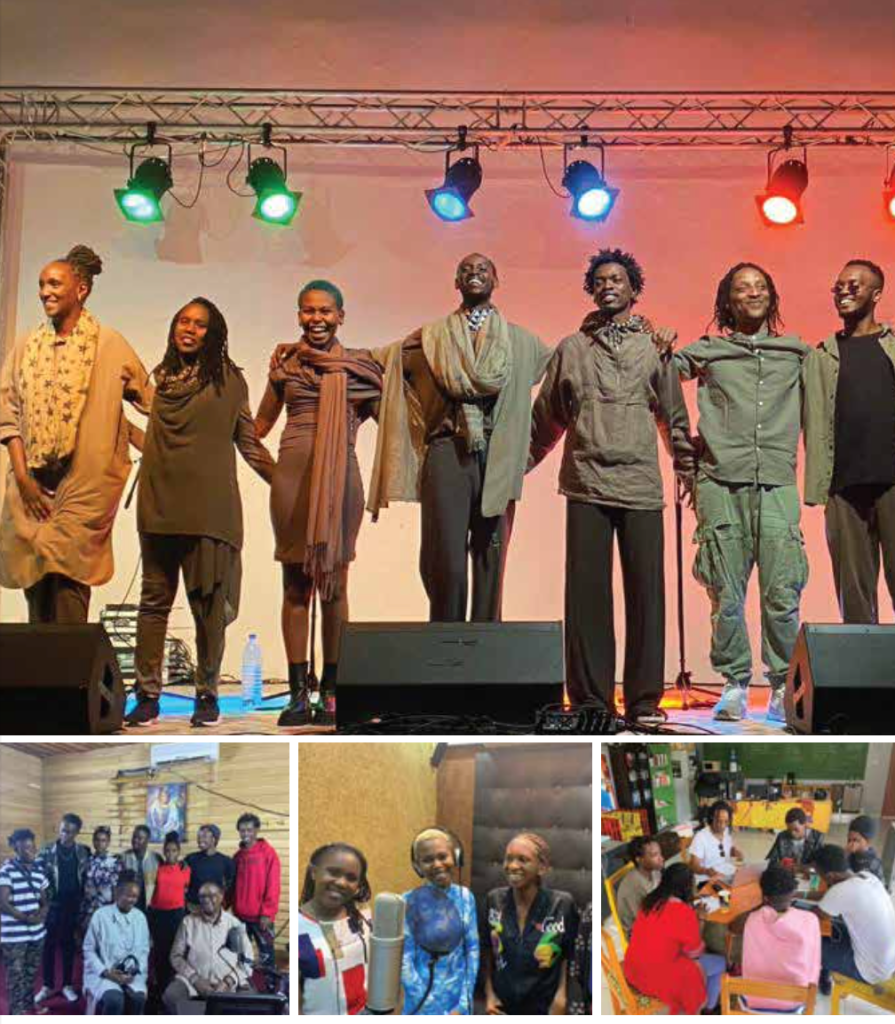
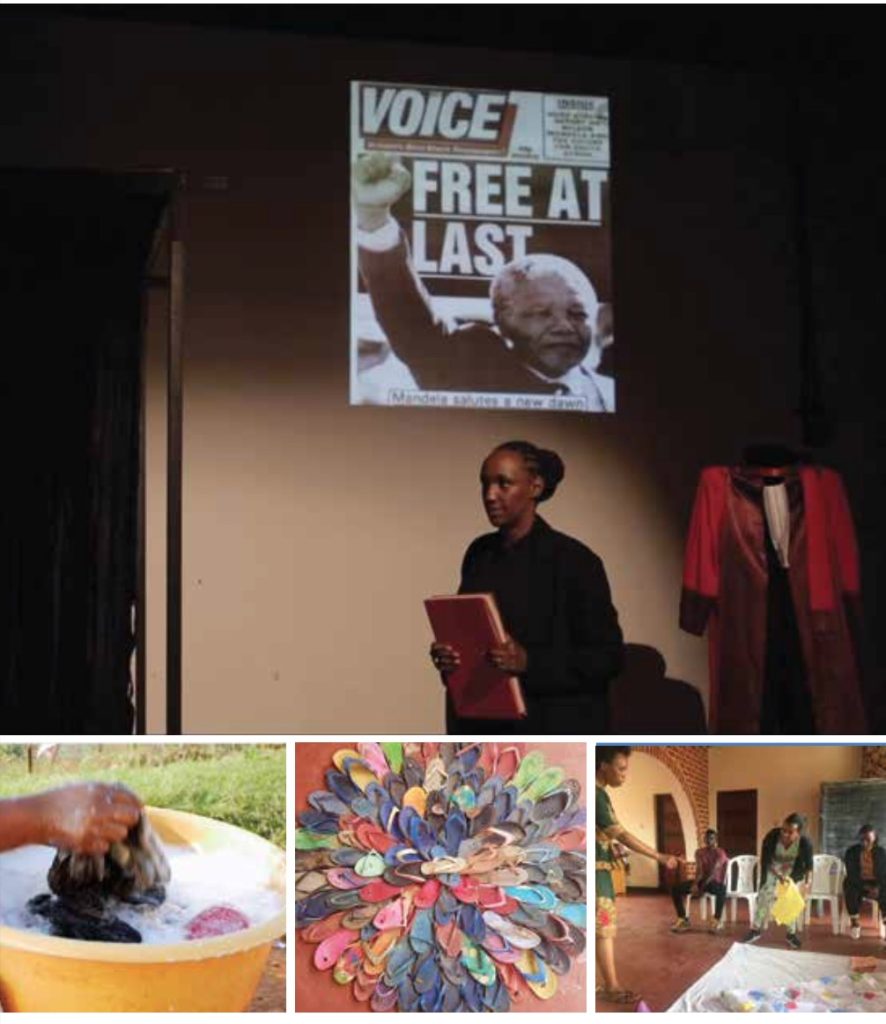
Closing Argument
A theater play that address the living and working conditions of the “invisibles” of the African society
Closing Argument
This play inspired by interviews and workshops organized with 100 of domestic workers in Rwanda and DRC is talking about the living and working conditions of the “invisibles” of the African society. It is specifically designed to be performed in people’s homes in the framework of “Home sweet home” festival produced by Ishyo arts centre since 2015 and its part of BEYOND CARING project.
Script: Mike Van Graan (South Africa)
Directors: Karishma Baghani (Kenya), Carole Karemera Video & music design: Art Corps
Set design: Karishma Baghani
A production of Ishyo Arts Centre and Hafenis - renaître Grands Lacs (DRC) with the support of the ACP Culture + program.
The cathedral of Sounds
A multidisciplinary installation exploring the Rwandan sound memory and history in three different times and spaces: present, past and future
The cathedral of sounds
The Cathedral of Sounds is a multidisciplinary artistic installation exploring the Rwandan sound memory and history in three different times and spaces: present, past and future. This composition is mixed with real memories of Rwandan people which have been collected through the “Arts & memory” hotline invited thousands of Rwandans to call and share a “positive” memory of a person (friend, family member, neighbor, etc.) who died during the 1994 genocide against the Tutsis in Rwanda
Public: from 15 years old
A production of Ishyo Arts Centre with the support of the European Union “Investing in people” program.
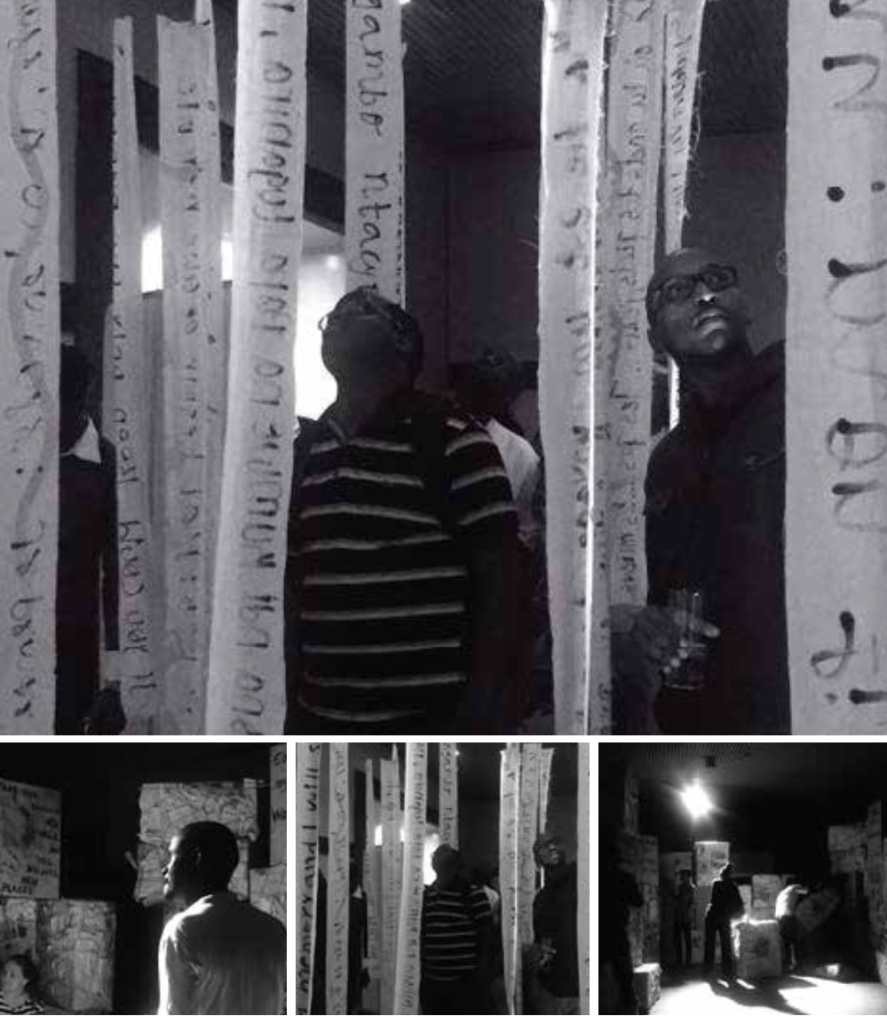

Abana b'Amazi
A theater play that deals with the vital resource water, the circumstances & consequences of its disappearance .
Children of Amazi
Author: Rivardo Niyonizigiye
Set design: Christine Falsschoen assisted by Jean de Dieu Kamel Ab’a Katia Music
composition: Aurélie Dorzée, Hervé Twahirwa
Public: From 6 years old
Length: 50 minutes
Languages of the play: English, French and Swahili
A co-production of Ishyo Arts Center (Rwanda), Théâtre du Papyrus (Belgium), Full Fun (Belgium), Théâtre Les Bambous, approved stage of national interest in Saint-Benoît, Réunion and Pierre de Lune, Center Scénique Jeunes Audiences in Brussels (Belgium). In partnership with Buja sans tabou (Burundi).
Murs Murs
A theater play that deals with transmission, with the things silently and implicitly given by grand mothers to mothers who in turn give it to their daughters.
Murs Murs
Adapted from "Onions make us cry" written by Zainabu Jallo
Adaptation, interviews and direction: Carole Karemera
Translation: Hervé Kimenyi Rutaremara
Set design: Laurent Béal & Alhadji Malenge
Tapestry and costumes: Jacques Sindabye With: Cécila Kankonda and Carole Karemera
Public: From 15 years old
Lenght: 1 hour and 10 minutes Language of the play: French & English
Production : Ishyo Arts Centre - Neva (Rwanda) / Théâtre de la Poudrerie (France)
Co-production: Compagnie Amounra (Belgium), with support from Commission Internationale du Théâtre Francophone and from Organisation Internationale de la Francophonie. This show is part of the international project « Women from Kigali, Sevran and Brussels».
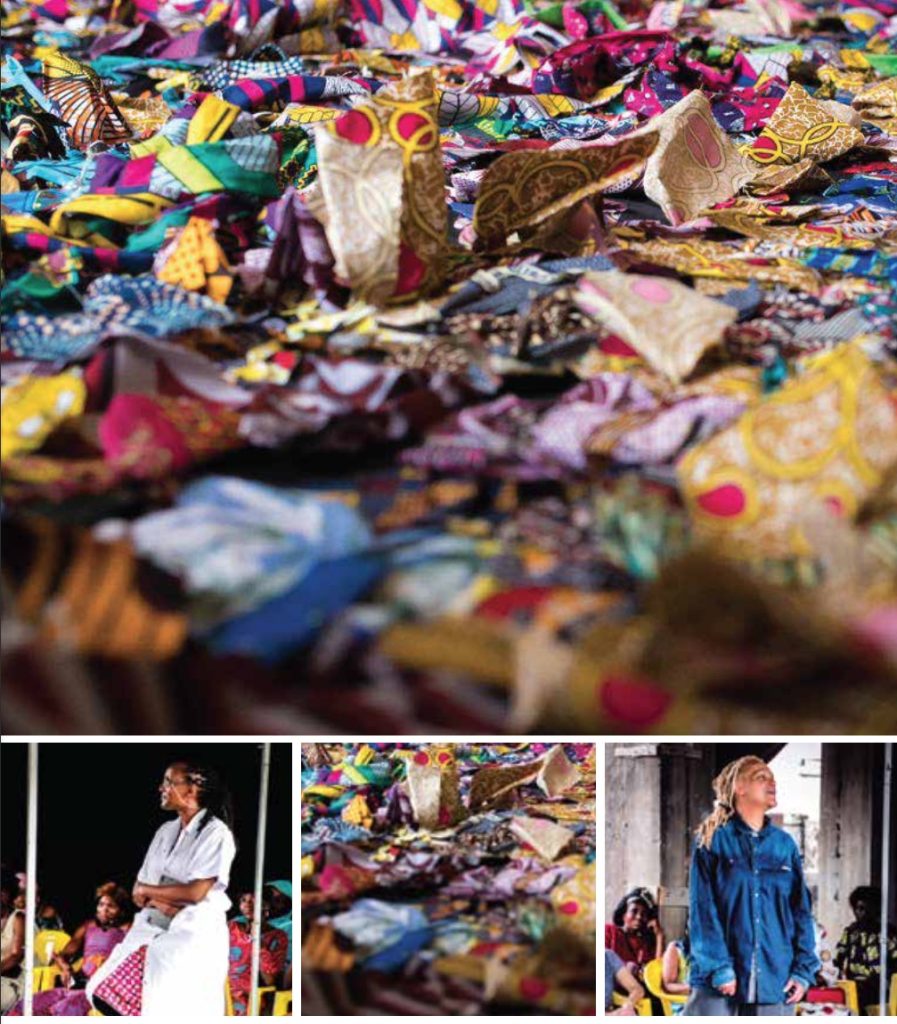
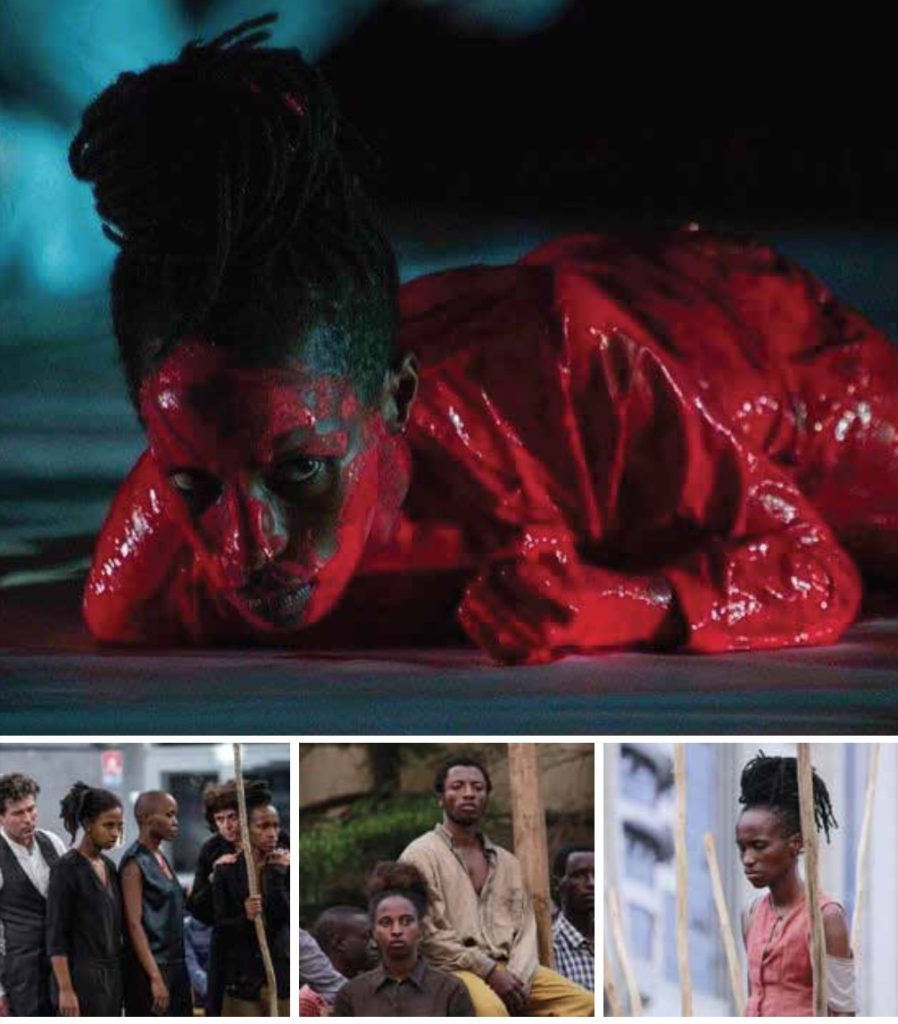
Ejo n’ejo bundi
A street theater play that tackles the history and memory of all genocides committed in the 20st century.
Ejo n’ejo bundi
Director: Dalila Boitaud
Co-artistic conception: Carole Karemera
Music composition: Thomas Boudé
Set design: Adrien Maufay
Sound Design: Cyril Dillard
Costumes: Agathe Laemmel assisted by Isabelle Bihoues
Choreography: François Rascalou
Public: From 15 years old Length: 1 hour and 10 minutes
Languages of the play: Mainly in French but with parts in Armenian, Hebreu, Kinyarwanda and Khmer
A production of Uz et Coutumes (France) and Ishyo Arts Centre with the support of CITF (Commission Internationale pour le Théâtre Francophone), OIF, Institut Français et la CNLG (Commission Nationale de Lutte contre le génocide), Le Musée de la Shoah (Paris).
We Call It Love
An intimate piece that invites spectators to reflect more broadly on their level of compassion and alertness towards the world the live in.
We call it love
Script: Felwine Sarr
Director: Denis Mpunga
Musical composition: Hervé Twahirwa Dramaturgy: Carole Karemera
Technical director: Judo Kanobana
Public: From 14 years old
Length: 1 hour
Language of the play: French & English
A production of Ishyo Arts Centre (Rwanda) in coproduction with Théâtre de la Poudrerie (France) with the support of the European Union “Investing in people” program, Sevran City Council and CITF.
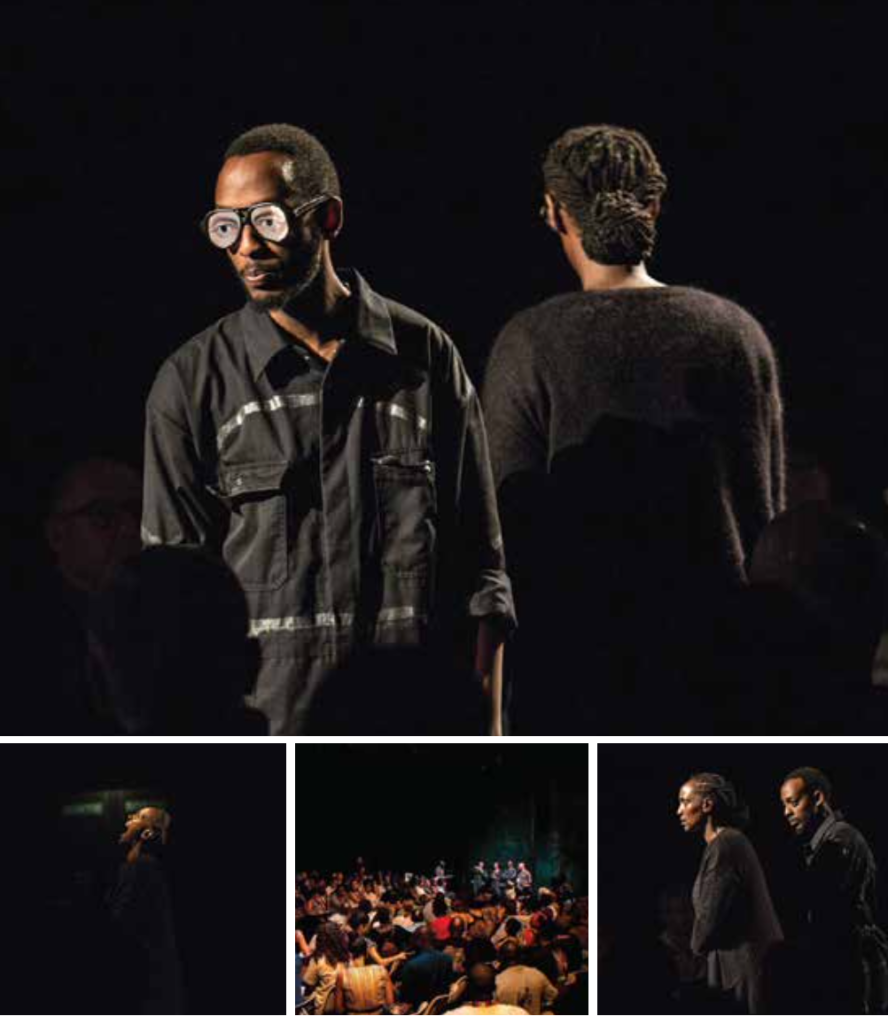
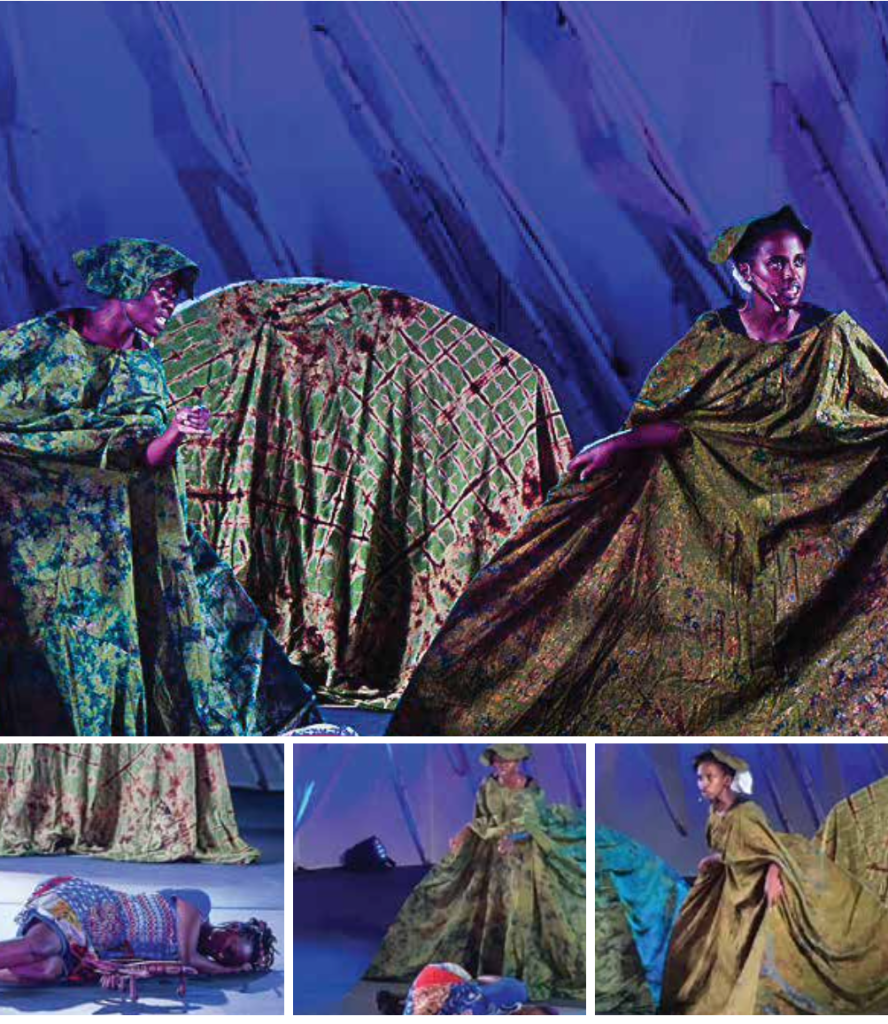
My Little Hill
A theater play that explore the complex origin and expression of conflict, but above all, witness the celebration of respect, tolerance and life.
My little hill
My little hill is a journey of sounds and rhythm, in the heart of Africa, more precisely in the land of a thousand hills: Rwanda.
Through the eyes and the friendship of two children coming from different parts of the world, we explore the complex origin and expression of conflict, but above all, witness the celebration of respect, tolerance and life.
Director: Carole Karemera
Music composition: Assiba Halabi
Playwright: Nicolas Grégoire – based on the musical album “Pitocha in the country of one thousand hills” by Ogres de Barback
Prop designers: Timothy Wandulu and France Messiaen
Costumes: Jacques Sindabye
Public: From 6 years old
Length: 45 minutes
Languages of the play: French and Kinyarwanda also available in English
A production of Ishyo Arts Centre
Mboka
A musical theater play which follows the story of a bookstore specialized in the history of the black world which threatens to close in order.
Mboka
A musical theater play which follows the story of a bookstore specialized in the history of the black world which threatens to close in order to give the space to a hair salon; two generations meet which do not understand each other. None of them finds the importance into fighting for the memory and the contribution of the black community to the humanity and choose to go with aggressive ‘capitalism’, others longing for knowledge and gratitude, fight to keep that source of knowledge in that deprived neighborhood for it to serve its inhabitants. From there, books and respected people who live in them, big and small profiles in history will bring fear and shake the protagonists’ beliefs, confronting them with their responsibilities and the redoubtable destiny coming for this source of knowledge.
Script: based on “Fix-up” by Kwame-Kwei Armah
Text adaption and direction: Carole Karemera
Musical composition: Cecilia Kankonda
Translation: Herve Kimenyi Rutaremera
Technical direction: Judo Kanobana
Scenography: Alhadji Malenge and Carole Karemera
Public: From 15 years old
Length: 1 hour 30 minutes
Language of the play: French & English
A production of Ishyo Arts Centre in partnership with Positive Production
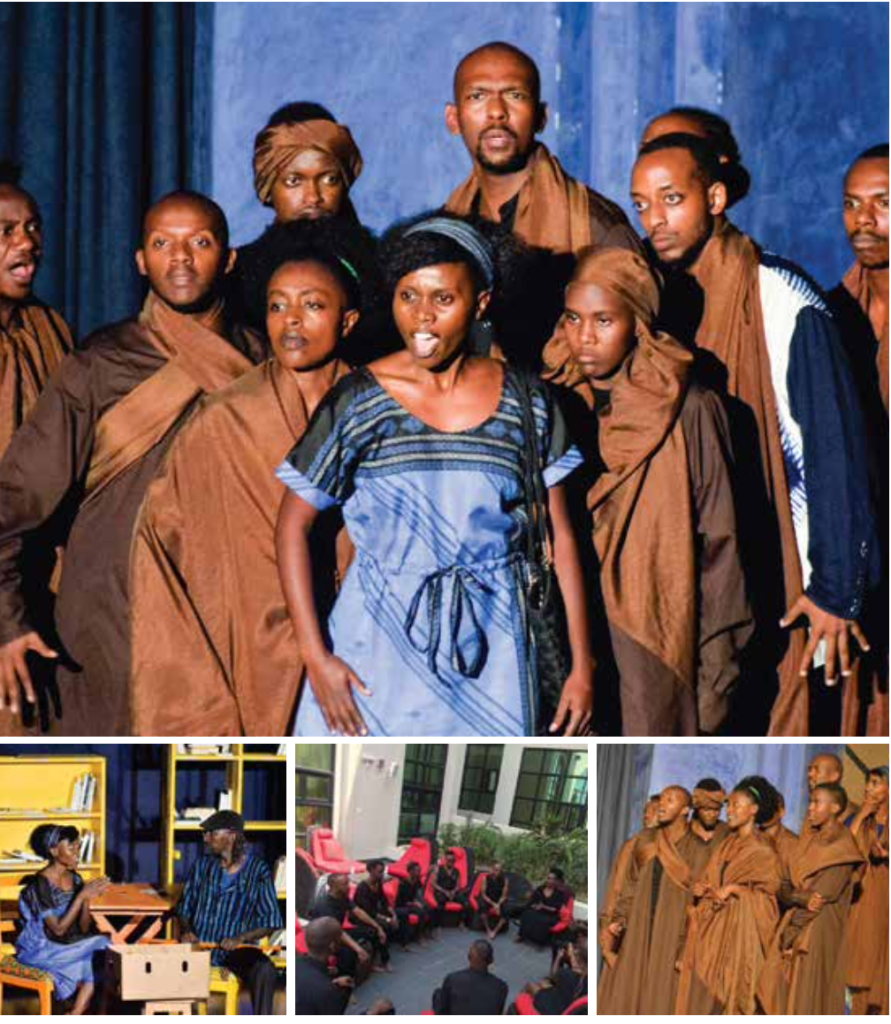
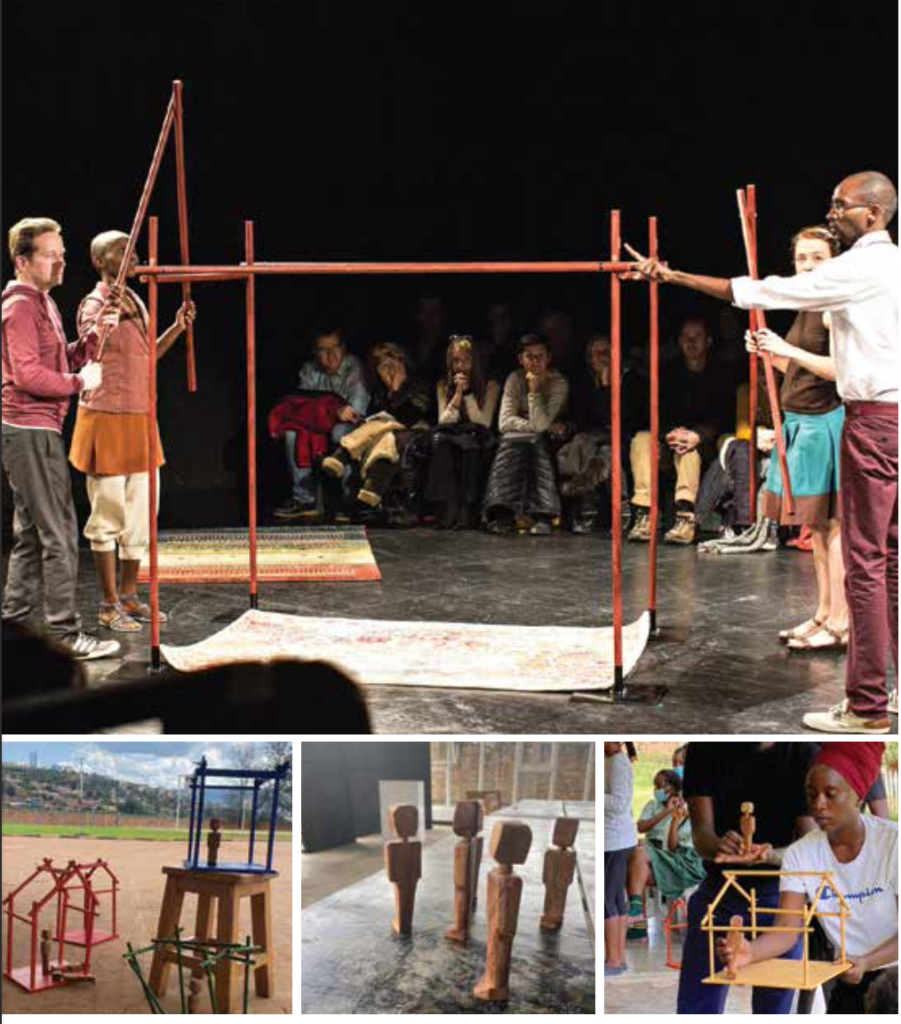
Our house
A theatre play exploring the questions of home and house in a time. where people are forced to leave theirs, building new lives and new relationships in a different country, with different cultures.
Our house
Just a whole, with traces on the ground.. but not MY house. I remember:
I used to hate that house!”
OUR HOUSE is a theatre play exploring the questions of home and house in a time where people are forced to leave theirs, building new lives and new relationships in a different country, with different cultures.
“If I want to meet a person, I go to his/her house.
If their house is no longer there or if someone else lives in it,
I have to begin to search for them. Where has he or she left ‘traces’ that I can follow? In other people’s heads, in stories or documents?
What makes a house, a home…?”
Directors: Carole Karemera and Barbara Kölling
Music composition: Roman Metzner and Hervé Twahirwa
Public: From 12 years old
Length: 1 hour
Languages of the play: English, French, Russian, German, Kinyarwanda
Tour: Hellwach Festival (Germany), Rwanda, Cradle of creativity (South Africa),
La Comédie de Clermont Ferrand (France)
A production of Helios Theater and Ishyo Arts Centre with the support of Kulturstiftung des Bundes/Turn Fund